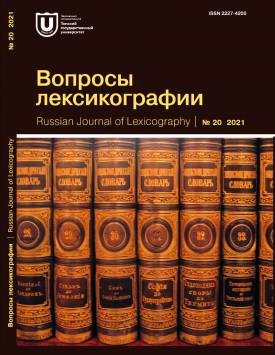On the Conception of the Modern Political Labels Dictionary
The article aims to describe the conception of the Modern Political Labels Dictionary being developed at the Siberian Federal University. The creation of such a dictionary is relevant owing to the development of political lexicography which allows revealing the state and features of modern political language development. It is also noted that political labels remain largely unstudied despite their wide and quite long-term use in media. The authors of both the dictionary and the article believe that it can be useful not only for specialists focused on conducting linguistic examinations of conflictogenic texts, but also for those who are interested in politics. The Modern Political Labels Dictionary makers see the main purpose of its creation in characterizing modern political discourse verbal labels used as a tool of information-psychological confrontation as completely as possible. The concept of the dictionary is based on the following definition of the term “political verbal label”: it is a nominative ideologeme (word and phrase) tending to stereotypization. It is a linear negative myth used to discredit socially and politically significant objects. A political verbal label is characterized by exaggerated pejorative connotations and weakened denotative components. The dictionary being developed is explanatory and illustrative. It also includes derivations and (optional) philological commentaries. The selection of speech samples for the dictionary was mainly based on a linguo-ideological analysis following the methodology proposed by N.A. Kupina that assumes the identification of key ideologeme labels in a text and analysis of their compatibility to reveal semantic, axiological, and aesthetic additives that reflect an author’s point of view on certain political events. The article also characterizes the dictionary structure including a theoretical introduction, dictionary entries, a glossary, and a list of abbreviations; examples of dictionary entries are provided. The words and phrases selected for the glossary passed verification procedure acting as Yandex, Google and Russian Language National Corpus search query to confirm their non-unity (usability): the existence of at least 3 to 5 contexts from different sources in which the selected unit is used with the same meaning was considered sufficient. It is noted in the description of a dictionary entry that it contains both mandatory (head unit; interpretation of its semantics in compliance with the principle of unification of interpretation models; speech samples from texts of various styles and genres created in post-Soviet and modern periods) and optional (commentaries on the functioning specifics of a political label: its origin, use periods, productivity and role in text; variations; synonyms and derivatives) components. It is concluded that the work on the dictionary made it possible to clarify the definition of the political labels phenomenon; identify the most common political labels, and expand the notion of their paradigmatic (synonymous, opposing) connections, word-formation capabilities, functioning specifics in modern public speech; and present the meta-reactions of society to their use. The above-mentioned makes it possible to fill the current gap in the theory of political linguistics.
Keywords
political lexicography, political labels dictionary, political lexicon, verbal labelAuthors
| Name | Organization | |
| Skovorodnikov Alexander P. | Siberian Federal University | skapnat@mail.ru |
| Kopnina Galina A. | Siberian Federal University | gkopnina@mail.ru |
References

On the Conception of the Modern Political Labels Dictionary | Voprosy leksikografii – Russian Journal of Lexicography. 2021. № 20. DOI: 10.17223/22274200/20/6
